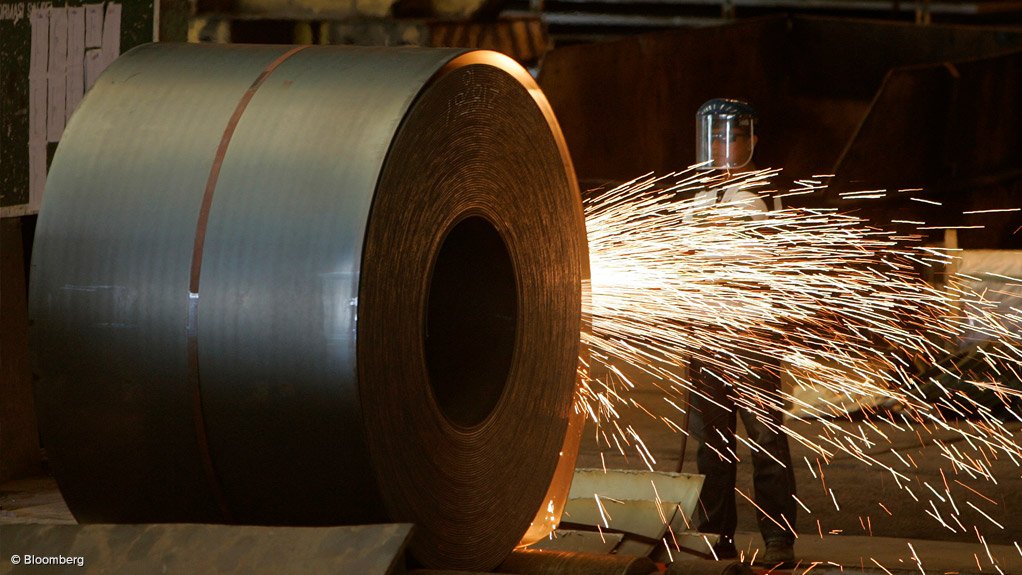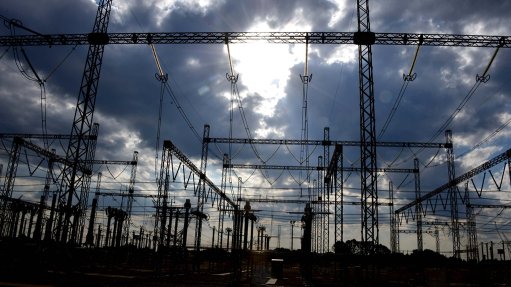Macsteel confirms court challenge against ‘unlawful’ extension of safeguard duties
Opposition to the extension of safeguard duties on steel imports is intensifying, with the country’s leading merchant challenging the extension of the duties in court and with others even questioning the economic benefits of sustaining a primary steel producer in the form of ArcelorMittal South Africa (AMSA).
Macsteel CEO Mike Benfield has confirmed that the company has taken what he describes as government’s “unlawful extension” of safeguard duties on certain steel grades to court and that the matter is scheduled to be heard in June.
Flat and long steel product imports into South Africa are subject to base tariff protection of 10%, but certain flat products are also subject to safeguard duties of a further 8%, resulting in overall protection of 18% on certain grades.
The 8% safeguard on hot-rolled coil was initially meant to expire in August 2020, but was extended following an AMSA application to the International Trade and Administration Commission of South Africa.
Benfield argues that this protection is “crippling the ailing downstream market”, and that any “sensible tariff framework” should focus on protecting the job-rich downstream industry, rather than upstream companies.
He adds that if the company wins its court case to eliminate tariffs, the downstream market will be able to compete on the same level.
Frustration within the downstream industry has been growing for several months, with companies facing both supply disruptions and steep price increases.
The crisis led Duferco MD Ludovico Sanges to convene a recent industry roundtable on the crisis, at which strong calls were made for an immediate scrapping of the safeguard duties, which were said to be driving up domestic prices.
National Employers Association of South Africa CEO Gerhard Papenfus, who participated in the discussion, reports that, over the past two months, AMSA has announced increases totalling 23%.
Papenfus blames the hikes partly on AMSA’s “basket price” model that government has accepted it can use in setting domestic flat-steel prices, but also notes that, absent the duties, imported steel could be supplied into Gauteng at “yes, you guessed it, 18% cheaper than the AMSA price”.
DELOCALISATION?
He says that, while ‘localisation’ may be the current buzz word within government, locally manufactured steel products have become uncompetitive “due to manufacturers that are forced to buy expensive AMSA steel as their raw material”.
“As long as the duties are imposed, ‘delocalisation’ will continue in South Africa as the importation of finished product escalates.”
Steel consumers are also chafing over supply shortages, which Benfield says can be attributed only partially to tight global market conditions.
Supply shortages, he says, have been exacerbated by Covid-9 lockdowns and China’s recent elimination of a 13% value-added tax rebate, which has reduced exports from the country by as much as 30-million tons.
“Locally AMSA has not predicted the downstream market correctly. The company based its operational plan on a May 2020 survey to project the demand, and the closure of the Saldanha plant has further exacerbated the situation. Unfortunately for the steel sector, AMSA was caught on the back foot,” Benfield says.
AMSA has indicated previously that the shortages are temporary, announcing in January that the restart of a second blast furnace at the Vanderbijlpark Works will position it to “quickly resolve” the shortfall.
The JSE-listed group has also argued that imports will fail to address any shortfall, as they will arrive only after the temporary supply backlog has been dealt with. There is, thus, in AMSA’s view, “no basis for lifting import and safeguard protection where there is adequate local capacity”.
However, Sanges describes the supply problem as a “long-standing” one, which has been further exacerbated by AMSA’s decision to close the Saldanha Steel mill and government’s decision to sustain safeguards.
Unless a remedy is urgently found, it is possible that Duferco and Safal could close.
South African Institute of Steel Construction CEO Paolo Trinchero, who has been critical of the safeguards for years, used the roundtable platform to assert that “tariffs are an outdated response” and a new one is required.
Given high steel prices currently, there is a growing view that tariff protection could be reduced or eliminated without jeopardising AMSA’s survival.
While Benfield believes there is virtue in sustaining AMSA as a primary producer, others in the sector are less sympathetic.
Roundtable participants have questioned the economic rationale, particularly in light of what they describe as unreliable supply, unacceptably long lead times, rising prices and questionable quality.
Benfield argues, however, that maintaining a primary producer means that the downstream industry does not need to invest as much working capital into their supply chain as would be the case should they rely solely on imports.
“We need to have a balanced view of what the sector needs in our country but what we need mostly is freedom of choice when it comes to supply. We don’t need to protect the primary steel producer. What we require is a level playing field and to protect the local manufacturers or downstream users that create so many jobs.”
Article Enquiry
Email Article
Save Article
Feedback
To advertise email advertising@creamermedia.co.za or click here
Press Office
Announcements
What's On
Subscribe to improve your user experience...
Option 1 (equivalent of R125 a month):
Receive a weekly copy of Creamer Media's Engineering News & Mining Weekly magazine
(print copy for those in South Africa and e-magazine for those outside of South Africa)
Receive daily email newsletters
Access to full search results
Access archive of magazine back copies
Access to Projects in Progress
Access to ONE Research Report of your choice in PDF format
Option 2 (equivalent of R375 a month):
All benefits from Option 1
PLUS
Access to Creamer Media's Research Channel Africa for ALL Research Reports, in PDF format, on various industrial and mining sectors
including Electricity; Water; Energy Transition; Hydrogen; Roads, Rail and Ports; Coal; Gold; Platinum; Battery Metals; etc.
Already a subscriber?
Forgotten your password?
Receive weekly copy of Creamer Media's Engineering News & Mining Weekly magazine (print copy for those in South Africa and e-magazine for those outside of South Africa)
➕
Recieve daily email newsletters
➕
Access to full search results
➕
Access archive of magazine back copies
➕
Access to Projects in Progress
➕
Access to ONE Research Report of your choice in PDF format
RESEARCH CHANNEL AFRICA
R4500 (equivalent of R375 a month)
SUBSCRIBEAll benefits from Option 1
➕
Access to Creamer Media's Research Channel Africa for ALL Research Reports on various industrial and mining sectors, in PDF format, including on:
Electricity
➕
Water
➕
Energy Transition
➕
Hydrogen
➕
Roads, Rail and Ports
➕
Coal
➕
Gold
➕
Platinum
➕
Battery Metals
➕
etc.
Receive all benefits from Option 1 or Option 2 delivered to numerous people at your company
➕
Multiple User names and Passwords for simultaneous log-ins
➕
Intranet integration access to all in your organisation



















